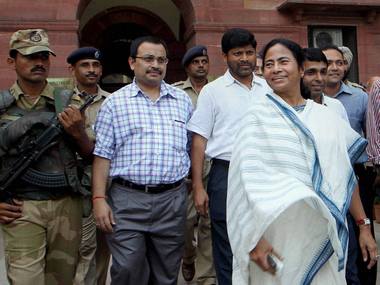
New Delhi, April 20: With just over a month left for the close of nominations for the presidential elections, the ruling Congress is focusing all its energies on zeroing in on a candidate who will secure the approval of its allies in the United Progressive Alliance.
The UPA holds around 40 per cent of the votes, approximately 10 per cent ahead of the Bharatiya Janata Party-led National Democratic Alliance. But given the unpredictability of its allies, particularly the erratic Trinamool Congress, the Congress would prefer not to risk a contest.
There are, of course, “friendly” non-NDA, non-UPA parties such as the Samajwadi Party and the Bahujan Samaj Party, both of which support the UPA from outside: however, their support cannot be taken for granted either.
Not surprisingly, therefore, an hour-long meeting between Trinamool chief and West Bengal Chief Minister Mamata Banerjee and SP supremo Mulayam Singh's emissary, Kiranmoy Nanda, on Tuesday in Kolkata on the possibility of the two parties joining hands for the presidential polls is causing unease in the Congress camp.
The two parties are apparently keen on a Muslim candidate and the name of the former President A.P.J. Abdul Kalam — who is also well regarded by the BJP — is being taken in this connection. The Congress would be happy with a Muslim president, but is not keen on Mr. Kalam's candidature, sources said.
The choice of Mr. Nanda as mediator is interesting as he was a minister in successive Left Front governments in West Bengal, while Mr. Singh enjoyed — and continues to enjoy — a good relationship with the CPI(M)'s national leadership.
Of course, after this meeting, Mr. Nanda was at pains to publicly state that his association with the Left Front in West Bengal was a “closed chapter”. The meeting is significant for another reason: earlier this year, there was speculation in political circles that the SP might replace the Trinamool in the UPA.
If the SP and the Trinamool band together, they could play a role in deciding who the next President is. It is also learnt that the SP has been in touch with the AIADMK.
The SP, whose strength has gone up substantially since the recent Uttar Pradesh Assembly polls, is clearly in a mood to effectively deploy its newly acquired clout. There is even talk that senior SP leader Ramgopal Yadav, Mr. Mulayam Singh's cousin, is being pushed by his party for the post of Deputy Chairperson of the Rajya Sabha.
Meanwhile, Lutyens's Delhi is awash with names for potential presidential candidates: Union Finance Minister Pranab Mukherjee, senior Congress leader and former Maharaja of Kashmir Karan Singh, Lok Sabha Speaker Meira Kumar, Chief Election Commissioner S.Y. Quraishi, Union Non-Conventional Energy Minister Farooq Abdullah, the former West Bengal Governor and Mahatma Gandhi's grandson Gopalkrishna Gandhi and Vice-President Hamid Ansari.





Comments
Add new comment